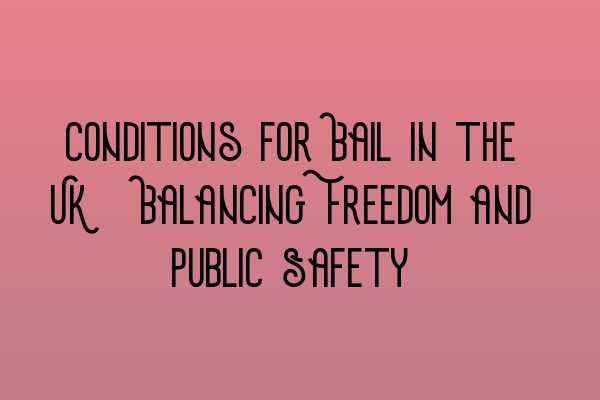Conditions for Bail in the UK: Balancing Freedom and Public Safety
When a person is accused of a crime in the UK, they are often faced with the question of whether they will be released on bail or held in custody until their trial. Bail is a legal process that allows an accused person to be released from custody, with certain conditions imposed to ensure they do not pose a risk to public safety or interfere with the criminal justice process.
In the UK, the decision to grant bail and the conditions attached to it are determined by the court. The court will consider a range of factors when making this decision, including the seriousness of the alleged offense, the strength of the evidence against the accused, and the likelihood of the accused appearing for their trial. It is important to note that the primary consideration of the court is public safety.
One of the key conditions that can be imposed as part of bail is a requirement for the accused to provide a financial guarantee. This can take the form of a cash deposit or a surety bond, which ensures that the accused has a significant financial incentive to comply with the conditions of their bail and appear for their trial. Failure to comply with the financial conditions may result in the forfeiture of the amount provided as a guarantee.
Another common condition of bail is the requirement to surrender the accused’s passport or travel documents. This condition helps to prevent the accused from leaving the jurisdiction and potentially evading justice. Additionally, the accused may be required to regularly report to a police station or other designated location, so their movements can be monitored and their compliance with bail conditions can be verified.
Depending on the circumstances of the case, the court may also impose additional conditions, such as a curfew, a prohibition on contacting certain individuals, or a requirement to reside at a specific address. These conditions are designed to address specific concerns related to the case and ensure public safety.
The decision to grant bail and the conditions imposed can have a significant impact on an accused person’s life. While the right to bail is an important aspect of the criminal justice system, it is essential to strike a balance between an individual’s right to freedom and the need to protect the public. Courts must carefully consider the facts of each case and the potential risks involved before making a decision.
It is worth noting that the conditions for bail in the UK may vary depending on the jurisdiction and the nature of the crime. It is therefore crucial for individuals facing criminal charges to seek legal advice from a qualified criminal solicitor who can provide guidance on the specific conditions that may apply in their case.
If you are preparing for the SQE exams and need assistance with Criminal Law and Practice, our SQE 1 and SQE 2 Preparation Courses can help you develop the knowledge and skills necessary to succeed. Additionally, you can enhance your preparation with our SQE 1 Practice Exam Questions and SQE 1 Practice Mocks FLK1 FLK2, which will allow you to test your understanding and identify any areas that require further study. Stay updated with the latest SRA SQE Exam Dates to ensure you are well-prepared for your exams.
At SQE Criminal Law & Practice Law UK, we understand the complexities of the UK legal system and are committed to providing comprehensive and effective preparation for the SQE exams. Our team of experienced solicitors and dedicated legal experts will guide you through the intricacies of criminal law and practice, ensuring you have the knowledge and skills necessary to succeed in your legal career.
Contact us today to learn more about our SQE preparation courses and how we can help you achieve your goals in the field of criminal law.
